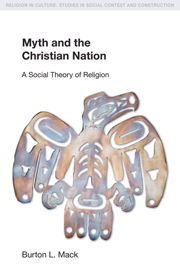Book contents
- Frontmatter
- Contents
- Dedication
- Preface
- Introduction
- Part I The Religions of Other Peoples
- Part II The Religion of Christianity
- Chapter 5 Early Christian Mythmaking
- Chapter 6 The Social Formation of Christendom
- Chapter 7 The State of the Christian Nation
- Chapter 8 Religions in a Polycultural World
- Conclusion
- Bibliography
- Index
Chapter 7 - The State of the Christian Nation
from Part II - The Religion of Christianity
- Frontmatter
- Contents
- Dedication
- Preface
- Introduction
- Part I The Religions of Other Peoples
- Part II The Religion of Christianity
- Chapter 5 Early Christian Mythmaking
- Chapter 6 The Social Formation of Christendom
- Chapter 7 The State of the Christian Nation
- Chapter 8 Religions in a Polycultural World
- Conclusion
- Bibliography
- Index
Summary
We have traced the imagined world of Christianity from its beginnings into the modern period and analyzed its myth and ritual structure at the point of medieval Christendom. It was relatively easy to do that, for the documentation was evident, public, and still available to us in texts, architecture, art, and the myth-ritual practices of the Christian churches that continued after the medieval period. On the basis of this analysis we theorized a mentality based upon the myth-ritual system as a kind of conceptual grammar. This was possible because of the way the church and its imagined world were taken for granted. We also noted the remarkable fact that, as the Roman Empire came to its end, and subsequent would-be emperors carved up the empire into separate and competing kingdoms, the church continued to function as a single, imperial institution of fundamental conceptual and structural importance. No monarch thought to rule any European kingdom that was not Christian.
From the period of the Reformation to the present, however, marked by the Enlightenment, the Industrial Revolution, and the rise of the nationstate, keeping track of the imagined world became more difficult. There were now many different Christian denominations relating variously to several new configurations of political domain and social structure. We noted that the church was still taken for granted in all European nations of the modern period, and that the myth-ritual pattern was still extant whether Protestant or Catholic.
- Type
- Chapter
- Information
- Myth and the Christian NationA Social Theory of Religion, pp. 217 - 248Publisher: Acumen PublishingPrint publication year: 2008



